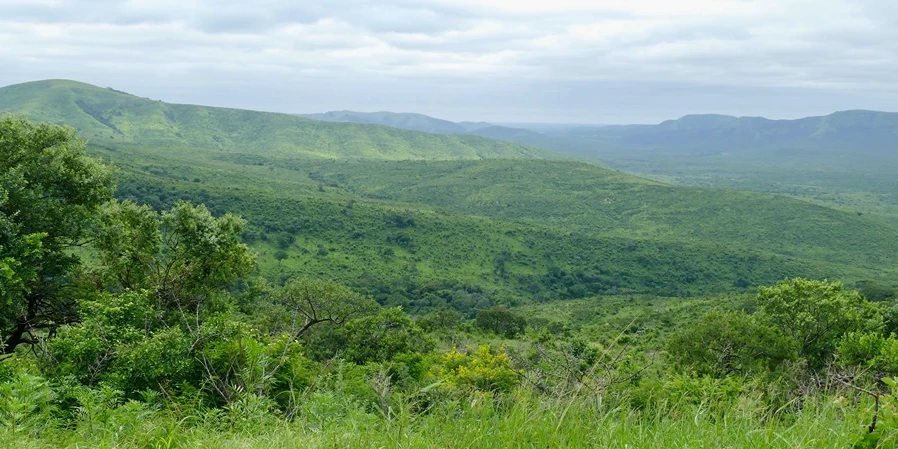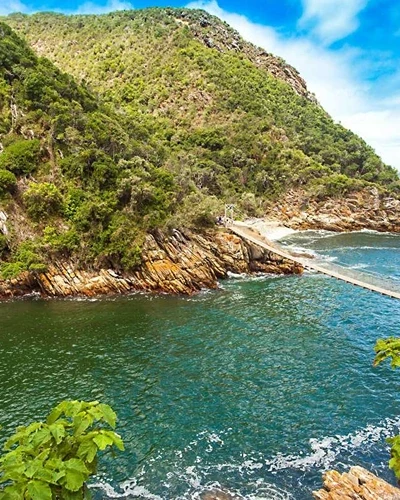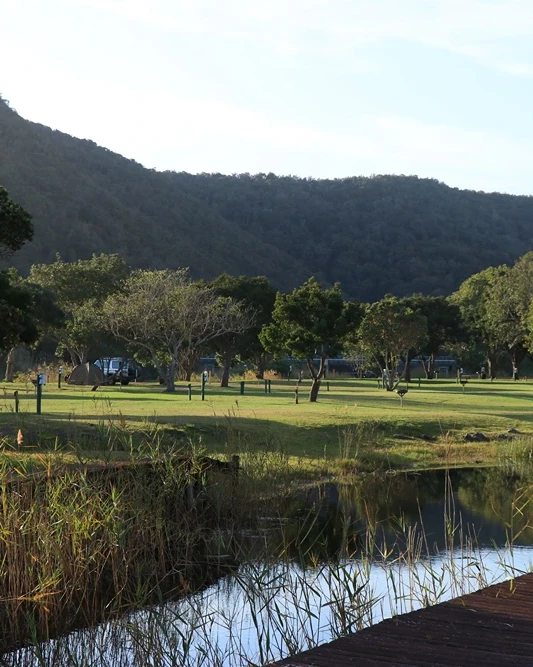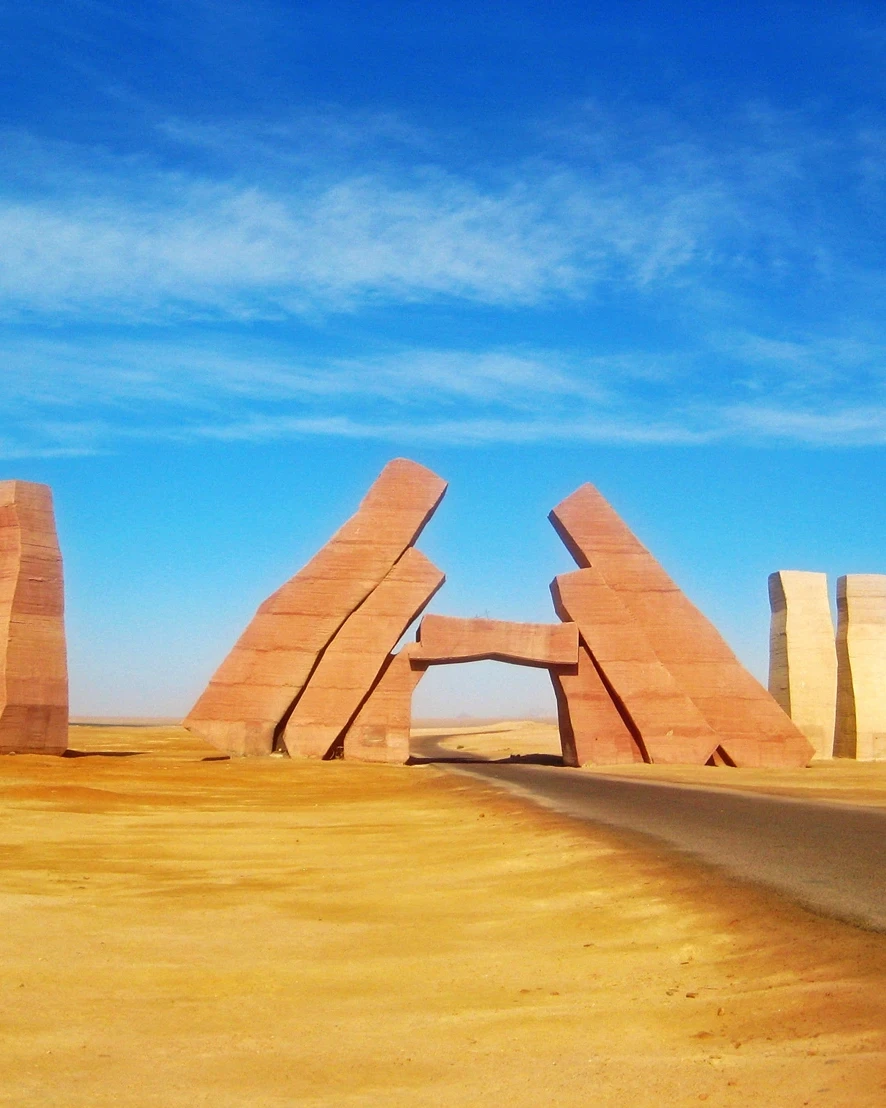Looking to escape into Africa’s oldest game reserve and witness the legendary Big 5 in their natural habitat? Hluhluwe-iMfolozi Park might just be the adventure you’ve been waiting for. Situated in KwaZulu Natal, South Africa, this 96,000-hectare park is not just about size but history and conservation too. Explore how this sanctuary for endangered species like the white rhino became a pivotal conservation success story. From thrilling safaris to self-guided hikes, the park offers unmatched experiences for wildlife enthusiasts. Ready to embark on a journey that offers more than just sightings? Dive into Hluhluwe-iMfolozi Park’s unique offerings.
Introduction to Hluhluwe-iMfolozi Park
Hluhluwe-iMfolozi Park, located in KwaZulu Natal, South Africa, is situated near the town of Hluhluwe, just 13 km away, and approximately 236 km from Durban. Covering an impressive 96,000 hectares, this park offers a vast expanse of wilderness to explore. Its strategic location makes it accessible for both local and international visitors seeking an authentic wildlife experience.
As the oldest proclaimed game reserve in Africa, Hluhluwe-iMfolozi Park has a rich history dating back to 1895. Initially established to protect the remaining population of southern white rhinos, the park has played a crucial role in wildlife conservation for over a century. Its historical significance is matched by its ongoing commitment to preserving biodiversity and maintaining ecological balance.
The park is home to an impressive array of wildlife species. Visitors can expect to encounter:
- African Big 5 (lion, elephant, buffalo, leopard, and rhino)
- Cheetahs
- Wild dogs
- Various antelope species
- Numerous bird species
Hluhluwe-iMfolozi Park is renowned for its significant conservation efforts, particularly in rhino protection. The park’s dedicated anti-poaching units and conservation programs have been instrumental in increasing the rhino population. Their efforts extend beyond rhinos, focusing on habitat preservation, anti-poaching measures, and community engagement to ensure the park remains a sanctuary for diverse wildlife.
How to Get to Hluhluwe-iMfolozi Park
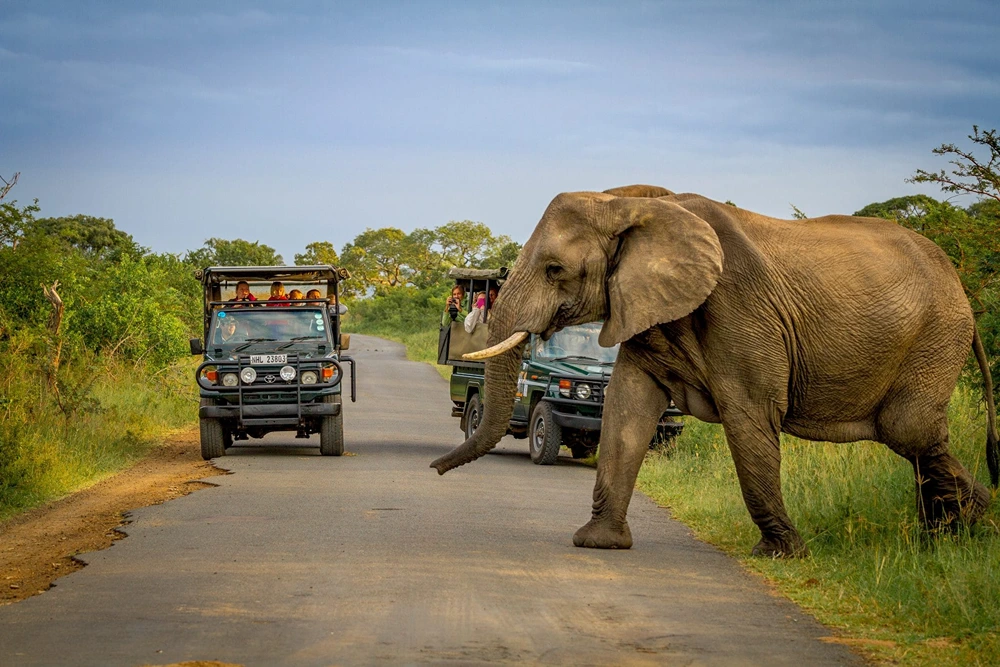
Traveling to Hluhluwe-iMfolozi Park is straightforward, with several cities offering convenient routes. From Durban, the park is a 2.5 to 3-hour drive, making it a popular choice for day trips and weekend getaways. Johannesburg is approximately a 7-hour drive away, ideal for those planning an extended visit. For travelers coming from Richards Bay, the journey takes just over an hour, providing a quick escape into nature.
Visitors can enter Hluhluwe-iMfolozi Park through three main gates, each providing access based on the point of departure:
- Nyalazi Gate: Best accessed from the N2 highway if traveling from Durban.
- Cengeni Gate: Suitable for those approaching from the southern parts of the park.
- Memorial Gate: Ideal for visitors arriving from the northern routes.
The park’s physical address is conveniently located near the town of Hluhluwe, only 13 km away. This proximity allows for easy access to essential services and accommodations in the town before or after your visit to the park.
Activities at Hluhluwe-iMfolozi Park
Hluhluwe-iMfolozi Park offers a wide range of safari options that cater to different preferences and schedules. Full-day and half-day Big 5 safaris are highly popular, allowing visitors to spot lions, elephants, buffalo, leopards, and rhinos in their natural habitat. For those looking for an extended adventure, multi-night safari packages provide a comprehensive wildlife experience, complete with guided tours and overnight stays within the park. These packages often include accommodation, meals, and multiple game drives, making them a convenient choice for wildlife enthusiasts.
Self-guided hikes are another excellent way to explore the park. The park features three designated trails, each offering unique landscapes and wildlife viewing opportunities. Hikers can obtain maps and information at the gate reception, where guides are also available for those who prefer a more structured experience. These trails range from easy to moderate difficulty, making them accessible to a broad audience. Whether you’re interested in a short walk or a longer trek, the park’s trails provide an immersive way to experience its diverse ecosystems.
Popular self-drive safari routes offer the flexibility to explore the park at your own pace. Key routes include:
- Southern iMfolozi section: Known for its open grasslands and scenic landscapes.
- Hluhluwe Loop: Offers excellent opportunities for spotting a variety of wildlife.
- Sontuli Loop: Ideal for those interested in bird watching.
- Nyala Drive: Features dense bush and is great for viewing antelope species.
For a different kind of adventure, the park also offers bush and boat safaris. Bush safaris take you deep into the park’s wilderness, providing an intimate look at its flora and fauna. Boat safaris, on the other hand, allow visitors to explore the park’s waterways, offering a unique perspective on its aquatic ecosystems. Both options are guided by experienced rangers who provide valuable insights and enhance the overall experience.
Accommodation Options in Hluhluwe-iMfolozi Park
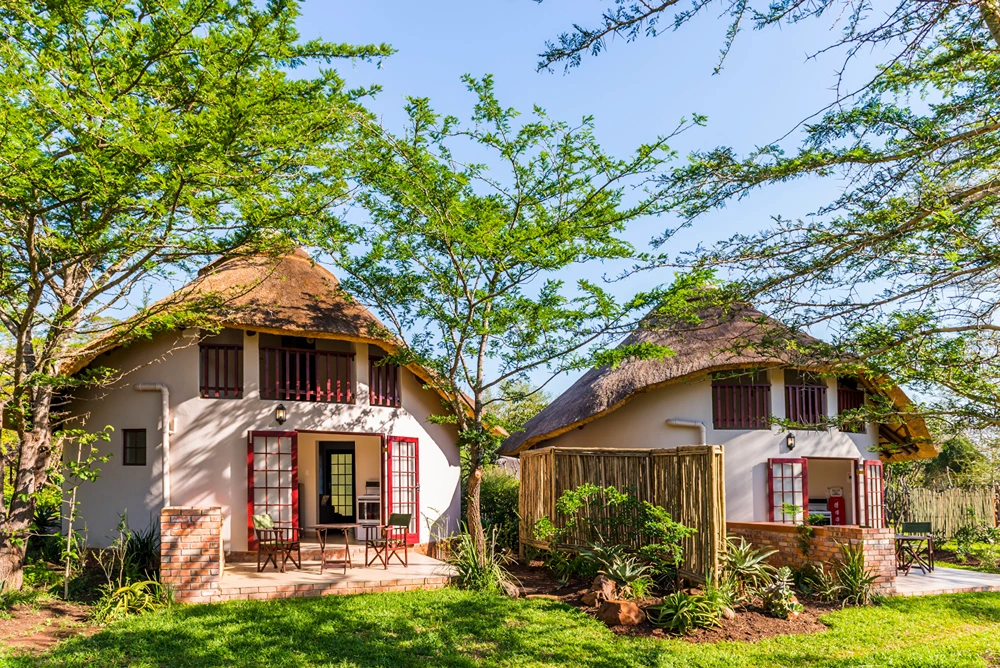
Hluhluwe-iMfolozi Park offers a range of accommodation options to suit different preferences and budgets. Two primary campsites within the park are Mpila Camp and Hilltop Camp. Mpila Camp, located in the southern part of the park, is a self-catering facility with no on-site restaurant. It provides a rustic experience, allowing visitors to immerse themselves in the natural surroundings. Hilltop Camp, situated in the northern section, offers more amenities including WiFi, a restaurant, and a variety of accommodation types ranging from rondavels to chalets. This makes Hilltop Camp a popular choice for those seeking a bit more comfort during their stay.
For those desiring a more luxurious stay, Rhino Ridge Safari Lodge is an excellent option. This lodge is the first private community-owned lodge within the park and offers an upscale experience with stunning views of the surrounding landscapes. Rhino Ridge features luxury suites, a spa, and fine dining, providing an elevated level of comfort and service. This lodge is ideal for visitors looking to enjoy the park’s natural beauty while indulging in premium amenities.
| Accommodation Type | Amenities |
| Mpila Camp | Self-catering, no restaurant |
| Hilltop Camp | WiFi, restaurant, various accommodation types |
| Rhino Ridge Safari Lodge | Luxury suites, spa, fine dining |
Budget accommodations are also available outside the park for those looking to minimize costs. The nearby town of Hluhluwe offers several guesthouses, bed and breakfasts, and budget hotels. These accommodations provide a convenient base for exploring the park while offering essential amenities without the higher price tags associated with in-park lodging. Staying in the town allows visitors to enjoy local hospitality and access nearby services before heading into the wilderness of Hluhluwe-iMfolozi Park.
Wildlife and Conservation Efforts at Hluhluwe-iMfolozi Park
Hluhluwe-iMfolozi Park is a haven for wildlife enthusiasts, boasting a diverse array of species. Visitors can encounter a wide range of animals within its 96,000 hectares. The park is home to the iconic African Big 5—lion, elephant, buffalo, leopard, and rhino. In addition to these, cheetahs, wild dogs, and various antelope species roam the landscape. Bird watchers will also find an impressive variety of bird species, making the park a comprehensive destination for wildlife observation.
Founded in 1895, Hluhluwe-iMfolozi Park holds the distinction of being Africa’s oldest proclaimed game reserve. The park’s inception was driven by a mission to protect the remaining population of southern white rhinos, which were on the brink of extinction. Over the years, Hluhluwe-iMfolozi has become a cornerstone of conservation, not only for rhinos but for a multitude of species. Its historical significance in wildlife preservation is matched by its ongoing efforts to maintain ecological balance and biodiversity.
- African Big 5: Stable populations
- Cheetahs: Vulnerable
- Wild Dogs: Endangered
- Various Antelope Species: Stable
- Bird Species: Diverse, generally stable
- White Rhinos: Near Threatened
Conservation programs at Hluhluwe-iMfolozi Park are extensive and multifaceted. The park’s anti-poaching units play a crucial role in safeguarding wildlife, particularly the highly threatened rhino population. Community engagement initiatives aim to involve local communities in conservation efforts, fostering a sense of ownership and responsibility. Habitat preservation projects focus on maintaining the park’s diverse ecosystems, ensuring a balanced environment where wildlife can thrive. These combined efforts make Hluhluwe-iMfolozi Park a leading example of successful conservation in action.
Entry Fees and Operating Hours for Hluhluwe-iMfolozi Park
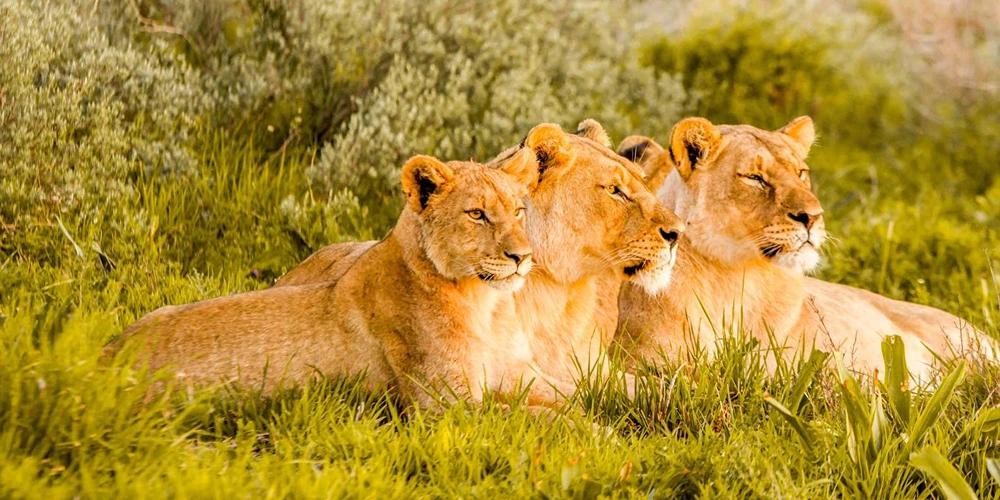
For 2023, the entry fees for Hluhluwe-iMfolozi Park are structured to accommodate various visitor needs. Day visitors can expect to pay around US$23 (R400) for adults and US$12 (R200) for children aged 3-12. These fees grant access to the park’s extensive wildlife and facilities, making it a worthwhile investment for an immersive nature experience. Visitors are advised to check the latest fees before planning their trip, as prices may vary.
- Day Pass: US$23 (R400) for adults, US$12 (R200) for children aged 3-12
- Annual Membership: Free entry for 365 days to Hluhluwe-iMfolozi and other Ezemvelo KZN parks
- Rhino Club Membership: US$18.70 (R320) for those under 60, US$15.20 (R260) for those over 60
The Rhino Club offers an excellent option for frequent visitors. Membership provides free entry to Hluhluwe-iMfolozi and other Ezemvelo KZN parks for an entire year. The cost is US$18.70 (R320) for individuals under 60 and US$15.20 (R260) for those over 60. This membership not only offers significant savings but also supports ongoing conservation efforts within the park.
Travel Tips for Hluhluwe-iMfolozi Park
The optimal time to visit Hluhluwe-iMfolozi Park is during the dry winter months from May to September. During this period, animal movements are more predictable as water sources are limited, increasing the chances of wildlife sightings. The cooler weather also makes outdoor activities more comfortable, avoiding the sweltering heat of the summer months. Planning your trip within this window can significantly enhance your overall experience.
When planning your visit, consider accessing the park via the N2 toll road from Durban. This route is well-maintained and provides a straightforward drive to the park’s main entrances. For those staying at Mpila Camp, it’s essential to bring self-catering supplies since the camp does not have a restaurant. Additionally, guided tours offer a more comprehensive exploration of the park, with knowledgeable guides who can provide valuable insights and enhance your wildlife-viewing experience.
- Bring self-catering supplies for Mpila Camp.
- Be cautious of monkeys; secure your food and belongings.
- Access the park via the N2 toll road from Durban.
- Consider guided tours for a more in-depth experience.
Weather conditions can also impact your visit. The dry season from May to September is cooler and more predictable, making it ideal for safaris and outdoor activities. During the wet season, from October to April, heavy rains can make some roads impassable and reduce wildlife visibility. Therefore, checking the weather forecast and preparing accordingly can help you maximize the enjoyment of your trip to Hluhluwe-iMfolozi Park.
Final Words
Exploring Hluhluwe-iMfolozi Park provides an enriching experience through its rich history, diverse wildlife, and comprehensive conservation efforts.
Travelers can reach the park easily from major cities like Durban and Johannesburg, entering through one of three gates. Activities range from guided Big 5 safaris to self-guided hikes, ensuring a memorable visit. Accommodation options cater to various preferences, from budget campsites to luxury lodges.
Hluhluwe-iMfolozi Park continues to thrive as a premier wildlife sanctuary, offering visitors an unforgettable adventure while supporting vital conservation efforts.
FAQ
What is Hluhluwe Imfolozi Park known for?
What does the name Hluhluwe mean in English?
Does Hluhluwe have Big 5?
What animals are in the Hluhluwe Imfolozi Park?
How can I get accommodation in Hluhluwe Game Reserve?
How do I buy Hluhluwe Imfolozi Park tickets?
Where can I find a map of Hluhluwe Imfolozi Park?
What is the entrance fee for Hluhluwe Imfolozi Park?
Can day visitors access Hluhluwe Game Reserve?
What is the contact number for Hluhluwe Game Reserve?
Where can I see photos of Hluhluwe Imfolozi Park?
Top Attractions
Think you’ve seen all that South Africa's nature has to…
Ever wondered where you can find rivers, beaches, forests,…
Are you ready to uncover the secrets of one of Egypt’s most…


